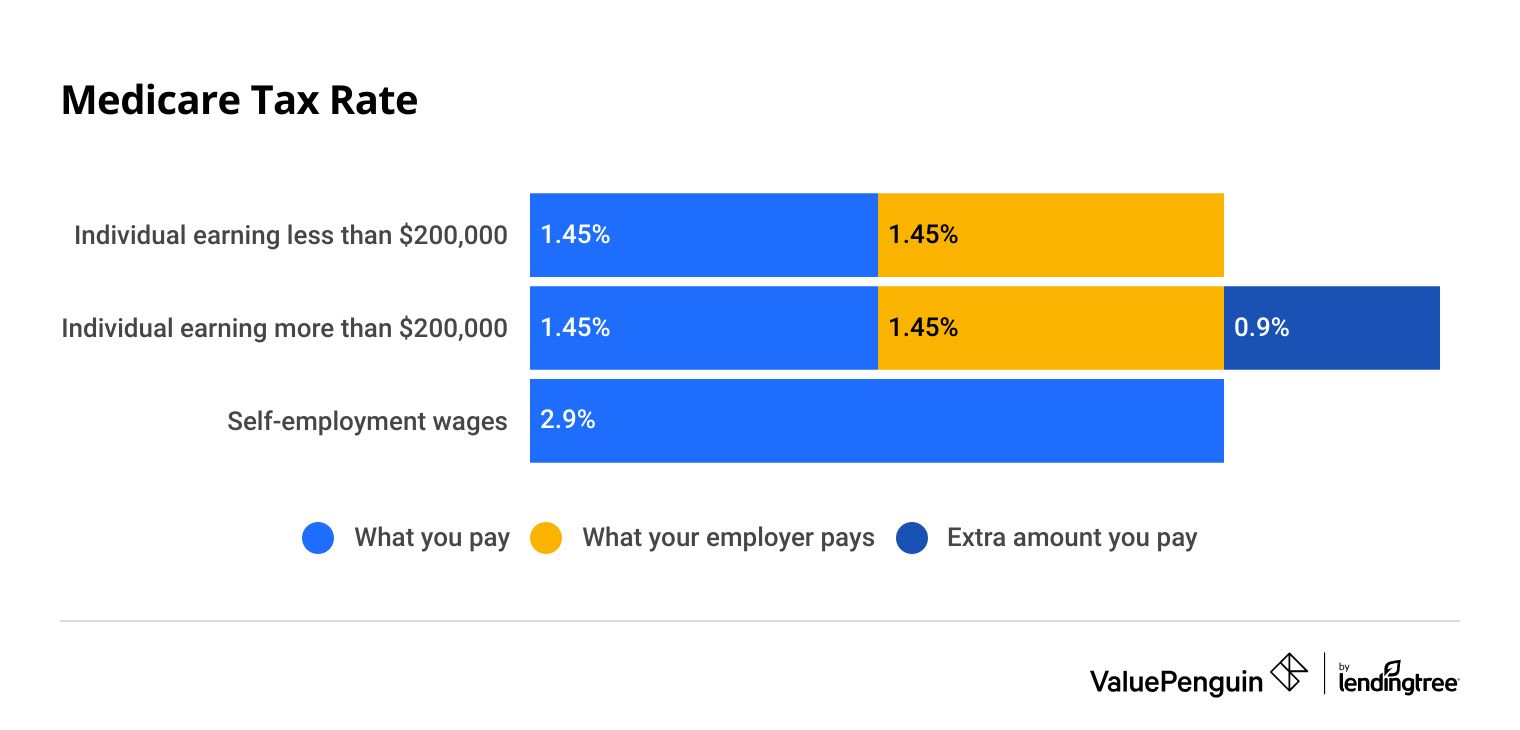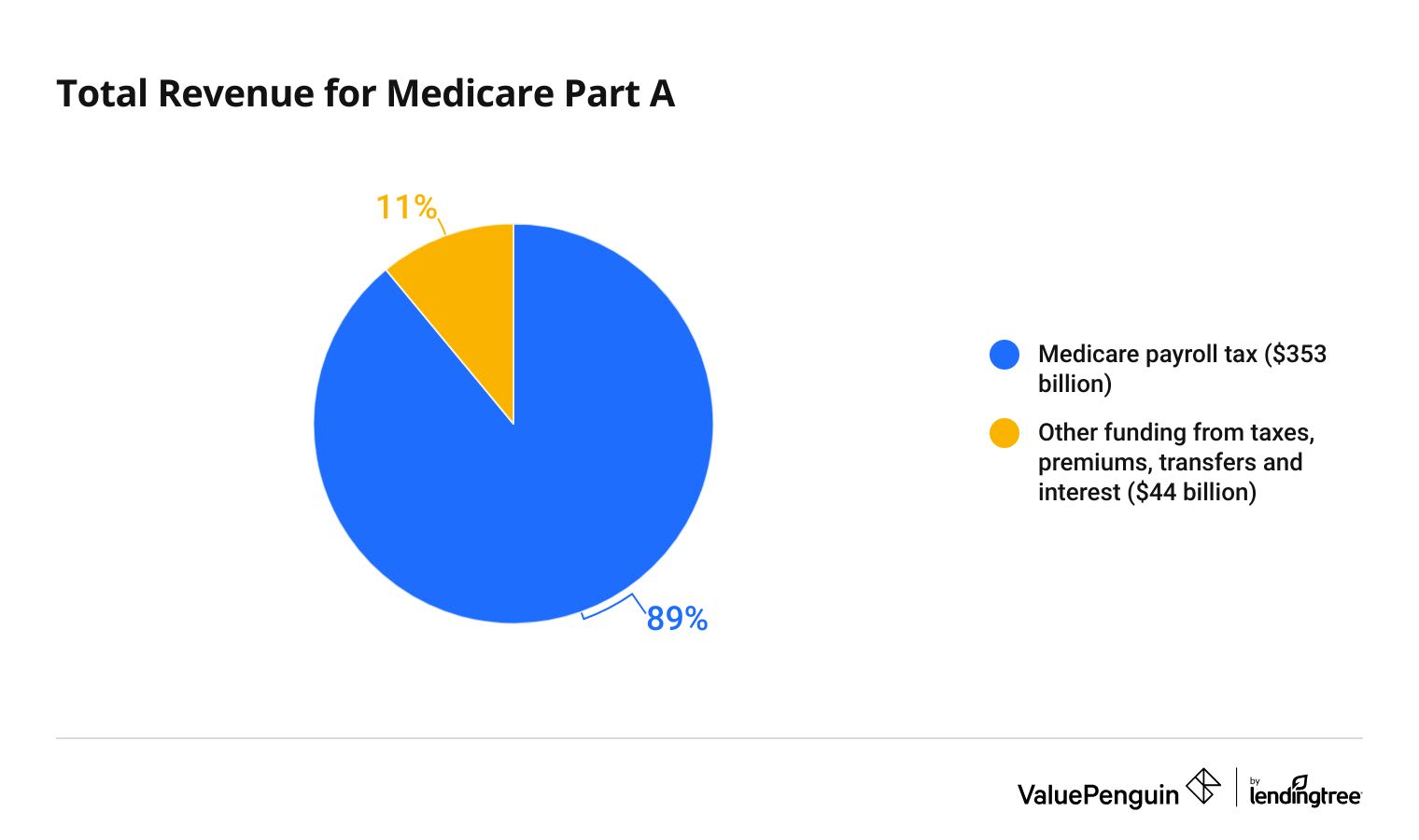What Is Medicare Tax? Definitions, Rates and Calculations
Medicare tax is taken out of your paycheck to pay for Medicare Part A, which provides hospital insurance to seniors and people with disabilities.
The total Medicare tax amount is split between employers and employees, each paying 1.45% of the employee's income. High-income earners pay a slightly higher percentage. If you're self-employed, you'll pay the tax with your quarterly tax filings.
Compare Medicare Plans in Your Area
What does Medicare tax mean?
Medicare tax is a federal income tax that pays for a portion of Medicare.
Because of the $353 billion paid in Medicare taxes each year, about 65 million seniors and people with disabilities have access to hospital care, skilled nursing and hospice.
Generally, all U.S.-based workers must pay Medicare tax on their wages.
The Medicare tax is grouped together under the Federal Insurance Contributions Act (FICA). That means when you're looking at your paycheck, you may see the Medicare tax combined with the Social Security tax as a single deduction for FICA.
In 1966, the Medicare tax was created to make insurance more affordable.
Many seniors have lower incomes after retirement, but they need more health care. Before the Medicare program provided insurance, a policy could cost more than seniors could afford, and sometimes insurance companies canceled policies as people got older.
What's the current Medicare tax rate?
In 2024, the Medicare tax rate is 1.45%. This is the amount you'll see come out of your paycheck, and it's matched with an additional 1.45% contribution from your employer for a total of 2.9% contributed on your behalf.

2024 Medicare tax rate
Medicare tax | Rate |
|---|---|
| You pay | 1.45% |
| Your employer pays | 1.45% |
If you're a high-income earner, you'll pay an Additional Medicare Tax withholding of 0.9% on any amount you earn above the annual threshold. In 2024, this threshold is $200,000 for individuals and $250,000 for those who file jointly.
2024 Additional Medicare Tax for high-income earners
Medicare tax | Rate |
|---|---|
| Base rate you pay | 1.45% |
| Additional amount you pay on income above the annual threshold | 0.9% |
| Your employer pays | 1.45% |
For those who are self-employed, the full 2.9% must be paid by the individual, rather than splitting the tax with an employer. This tax toward Medicare is included in the self-employment tax that is paid quarterly through estimated tax payments.
The self-employment tax amount is based on net earnings calculated using IRS form Schedule SE. Even though the tax rate is higher when you're self-employed, it's being paid on a smaller portion of income because your taxable income is 92.35% of earnings after business expenses.
If you're self-employed and have a high income, the Additional Medicare Tax of 0.9% also applies for any income above the annual threshold.
2024 Medicare tax for self-employed
Medicare tax | Rate |
|---|---|
| Rate you pay on 92% of net earnings | 2.9% |
| Additional amount you pay on income above the annual threshold | 0.9% |
How does the Medicare tax work?
Medicare tax is in two parts — you'll pay a portion as an automatic deduction from your paycheck, and your employer pays the other part.
The tax is based on "Medicare taxable wages," a calculation that uses your total pay and subtracts pretax health care deductions such as medical insurance, dental, vision or health savings accounts.
Your employer is required to collect the tax, and it sends both the employee and employer versions to the IRS through regular electronic deposits.
For example, an individual with an annual salary of $50,000 would have a 1.45% Medicare tax deducted from their paycheck. That's about $60 each month. The employer would pay an additional $60 each month on their behalf, totaling $120 contributed to Medicare.
Those who are self-employed pay a Medicare tax as a part of the self-employment tax. Rather than being deducted from a paycheck, the money is paid through quarterly estimated tax payments.
The Medicare tax rate has remained unchanged since 1986. But in 2013, an Additional Medicare Tax for high-income earners was implemented as part of the Affordable Care Act.
What is the Medicare tax used for?
The Medicare tax pays for Medicare Part A, providing health insurance for those age 65 and older and people with disabilities or certain medical issues. Medicare Part A, also known as hospital insurance, covers health care costs such as:
- Overnight hospital stays
- Skilled nursing care
- Hospice
- Some home health services
The tax collected for Medicare accounts for 89% of the total revenue for Medicare Part A.

Total revenue for Medicare Part A
- Medicare payroll tax: 89% ($353 billion)
- Other funding from taxes, premiums, transfers and interest: 11% ($44 billion)
The Medicare Tax only funds Medicare Part A. Funding for other parts of Medicare come from different sources such as monthly payments from enrollees and the federal budget.
All revenue for Medicare Part A goes into the Hospital Insurance (HI) trust fund, which is slowly being depleted because the expenses for associated health services have generally been higher than the fund's annual revenue.
In 2023, the Congressional Budget Office (CBO) projected the Medicare trust fund will be fully depleted in 10 years.
What is the Additional Medicare Tax used for?
Even though it has Medicare in the name, the Additional Medicare Tax paid by high-income earners is used to pay for parts of the Affordable Care Act (ACA), according to the IRS. These funds are used to provide health insurance tax credits which make health insurance more affordable for 14 million people.
What wages are subject to the Medicare tax?
You'll pay the Medicare tax on all types of taxable income. This includes your salary, overtime, paid time off, tips and bonuses.
There is no cap on the amount of income you pay Medicare taxes on. This differs from the Social Security tax, which you pay only on the first $168,600 of your yearly earnings in 2024. That's an increase from $160,200 in 2023.
Some pretax deductions may be excluded from Medicare wages, but others are included.
- You won't pay the Medicare tax on pretax payments for medical insurance or contributions toward a health savings account.
- Medicare tax is charged on what you contribute to a retirement account and premiums paid for life insurance, even though these funds are excluded from your federal income taxes.
Are Medicare taxes charged on investment income?
Yes. If you received investment income last year, you'll be taxed 3.8% on either your net investment income or your adjusted gross income (AGI) above the annual maximum , whichever is less.
Even though the name indicates proceeds go to Medicare, revenue, called the Unearned Income Medicare Contribution, goes into a general fund and is not earmarked for Medicare.
Frequently asked questions
What type of tax is Medicare?
Medicare tax is a federal employment tax that's automatically deducted from your paycheck. The tax pays for hospital insurance for seniors and people with disabilities.
What is the FICA tax on my paycheck?
The FICA tax (short for Federal Insurance Contributions Act) is a deduction from your paycheck that's used to pay for Social Security and Medicare. The 2024 FICA tax rate means 7.65% comes out of your paycheck, which includes a Social Security tax of 6.2% and the Medicare tax of 1.45%. Your FICA deduction is matched by your employer for a total FICA tax rate of 15.3% paid to the government.
What does it mean if you see a Medicare deduction on your paycheck?
If you see a Medicare deduction on your paycheck, it means that your employer is fulfilling its payroll responsibilities. This Medicare Hospital Insurance tax is a required payroll deduction and provides health care to seniors and people with disabilities.
What happens if your employer did not withhold Social Security and Medicare taxes?
Employers that do not adhere to tax laws by withholding FICA taxes for Social Security and Medicare could be subject to criminal and civil sanctions. If you don't see taxes being withheld, check with your company to make sure there wasn't an error or that you didn't claim to be exempt on your W-4 form. If you underpaid, you may have to pay a tax penalty at the end of the year.
How do I pay Medicare tax if I am self-employed?
When you're self-employed, you'll typically file estimated taxes quarterly and use the estimated tax payments to pay your self-employment tax including Social Security and Medicare taxes. That's because the Medicare tax is not withheld from your paycheck by your employer.
What is a Medicare benefit tax statement?
A Medicare benefit statement is a tax form that's mailed each year proving you health insurance because you were enrolled in Medicare. Also called a 1095-B, this statement can be used if the IRS asks you to verify your health insurance coverage.
Sources
- Internal Revenue Service (IRS)
- Congressional Budget Office (CBO)
- Centers for Medicare & Medicaid Services (CMS)
- Social Security Administration (SSA)
- Congress' Joint Committee on Taxation (JCT)
- Kaiser Family Foundation (KFF)
ValuePenguin.com is owned and operated by LendingTree, LLC ("LendingTree"). All rights reserved.
Invitations for application for insurance may be made through QW Insurance Solutions, LLC ("QWIS"), a separate subsidiary of QuoteWizard, LLC ("QuoteWizard"), a LendingTree subsidiary, or through its designated agents, only where licensed and appointed. QWIS is a non-government licensed health insurance agency and is not affiliated with or endorsed by any government agency. Find licensing information for QWIS.
Callers will be directed to a licensed and certified representative of Medicare Supplement insurance and/or Medicare Advantage HMO, HMO SNP, PPO, PPO SNP and PFFS organizations. Calls will be routed to a licensed insurance agent who can provide you with further information about the insurance plans offered by one or more nationally recognized insurance companies. Each of the organizations they represent has a Medicare contract. Enrollment in any plan depends on contract renewal.
Availability of benefits and plans varies by carrier and location and may be limited to certain times of the year, unless you qualify for a Special Enrollment Period. We do not offer every plan available in your area. Currently we represent 73 organizations that offer 5,110 products in your area. Contact Medicare.gov or 1-800-MEDICARE, or your local State Health Insurance Program (SHIP), to get information on all of your options.
These numbers provided are not specific to your area, but rather represent the number of organizations and the number of products available on a national basis. We will connect you with licensed insurance agents who can provide information about the number of organizations they represent and the number of products they offer in your service area. Not all plans offer all of these benefits. Benefits may vary by carrier and location. Limitations and exclusions may apply.
Medicare has neither reviewed nor endorsed the information contained on this website.
Medicare supplement insurance is available to people age 65 or older enrolled in Medicare Parts A and B, and in some states to those under age 65 eligible for Medicare due to disability or end stage renal disease.
Medicare Advantage and Part D plans and benefits are offered by these carriers: Aetna Medicare, Anthem Blue Cross Blue Shield, Anthem Blue Cross, Aspire Health Plan, Cigna Healthcare, Dean Health Plan, Devoted Health, Florida Blue Medicare, GlobalHealth, Health Care Service Corporation, Healthy Blue, Humana, Molina Healthcare, Mutual of Omaha, Premera Blue Cross, Medica Central Health Plan, SCAN Health Plan, Baylor Scott & White Health Plan, Simply, UnitedHealthcare, Wellcare and WellPoint.
MULTIPLAN_QW.VP.WEB_C
Editorial Note: We are committed to providing accurate content that helps you make informed financial decisions. Our partners have not endorsed or commissioned this content.
